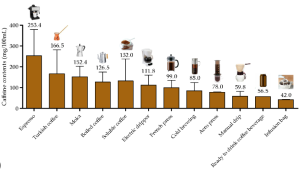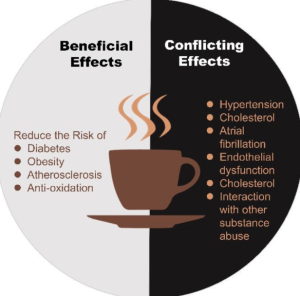Caffeine Consumption Guidelines for Indians
According to the Food Safety and Standards Authority of India (FSSAI), the recommended daily intake for adults is up to 400 milligrams (mg). This is equivalent to about four cups of brewed coffee or ten cans of cola.
Comparison to Other Countries
The recommended daily intake varies from country to country. Here is a comparison consumption guidelines for some countries:
| Country | Recommended Daily Intake (mg) |
|---|---|
| India | Up to 400 |
| United States | Up to 400 |
| Canada | Up to 400 |
| United Kingdom | Up to 300 |
| Australia | Up to 400 |
| Japan | Up to 200 |
Factors to Consider
The recommended daily intake is based on several factors, including:
- Body weight: IT is metabolized differently depending on body weight. Heavier individuals may be able to tolerate higher doses of caffeine.
- Age: It sensitivity decreases with age. Older adults may experience more adverse effects from caffeine consumption.
- Health conditions: Certain health conditions, such as anxiety, insomnia, and heart disease, can be aggravated by caffeine consumption.
- Pregnancy and breastfeeding: It can cross the placenta and enter breast milk. Pregnant and breastfeeding women should limit their intake.
The recommended daily intake of caffeine for Indians is up to 400 mg, which is comparable to the guidelines in other countries. However, individual factors should be considered when determining the appropriate caffeine intake for each perso

Consumption Guidelines: A Comprehensive Guide to Safe and Effective Intake
Introduction
A central nervous system stimulant found in coffee, tea, energy drinks, and other products, has become an integral part of modern life for many individuals. While moderate caffeine consumption can provide various benefits, including improved alertness, cognitive function, and physical performance, excessive intake can lead to a range of adverse effects. Therefore, it is essential to establish clear guidelines for caffeine consumption to optimize its benefits while minimizing potential risks.
Physiological Effects
Caffeine exerts its effects primarily by antagonizing adenosine receptors in the brain. Adenosine is a neurotransmitter that promotes relaxation and sleep. By blocking adenosine receptors, caffeine prevents adenosine from binding and exerting its inhibitory effects, leading to increased alertness, wakefulness, and stimulation.
It increases the release of neurotransmitters such as dopamine and norepinephrine, which are involved in mood regulation, attention, and motivation. Additionally, caffeine can stimulate the release of fatty acids from fat cells, providing an energy boost.
Benefits of Moderate Consumption
Numerous studies have demonstrated the potential benefits of moderate caffeine consumption, including:
- Improved alertness and cognitive function: as shown to enhance alertness, attention, and concentration, particularly in situations requiring sustained mental effort.
- Enhanced physical performance: Caffeine can improve physical endurance, strength, and power in various athletic activities.
- Reduced risk of certain diseases: Moderate consumption has been associated with a reduced risk of developing type 2 diabetes, Parkinson’s disease, and Alzheimer’s disease.
Risks of Excessive Consumption
While moderate intake is generally safe, excessive consumption can lead to several adverse effects, including:
- Anxiety and insomnia: High doses of caffeine can trigger anxiety, nervousness, and difficulty falling asleep.
- Heart palpitations and arrhythmias: IT can increase heart rate and blood pressure, and in some individuals, excessive intake can lead to heart palpitations or arrhythmias.
- Diuretic effects: it has a diuretic effect, which can lead to dehydration if excessive amounts are consumed without adequate fluid intake.
- Withdrawal symptoms: Regular caffeine consumers who abruptly stop or significantly reduce their intake may experience withdrawal symptoms such as headaches, fatigue, and irritability.
Recommended Intake Guidelines
To maximize the benefits of caffeine while minimizing potential risks, it is important to adhere to recommended intake guidelines. The Food and Drug Administration (FDA) advises healthy adults to consume no more than 400 milligrams of caffeine per day, which is equivalent to approximately four cups of coffee or ten cans of cola.
Pregnant women and individuals with certain health conditions, such as heart problems or anxiety disorders, may need to limit their intake or avoid it altogether.
Factors to Consider
When determining appropriate intake, several factors should be considered, including:
- Individual sensitivity: Some individuals are more sensitive to the effects of caffeine than others.
- Source : Different sources of caffeine contain varying amounts of the stimulant. For example, a cup of coffee typically contains more caffeine than a cup of tea.
- Combined intake: It is important to consider intake from all sources, including food, beverages, and supplements.
It can provide various benefits when consumed in moderation, but excessive intake can lead to adverse effects. By adhering to recommended intake guidelines and considering individual factors, individuals can optimize the benefits while minimizing potential risks. Healthcare professionals can provide personalized guidance to help individuals establish appropriate consumption habits.
CATEGORIES: AUTOMOBILE BUSINESS FOOD HEALTH INTERIOR LIFESTYLE SPORTS TRAVEL TECHNOLOGY
Benefits & Risks of Excessive Consumption of Coffee
Coffee, a widely consumed beverage worldwide, is an integral part of many cultures and daily routines. Its popularity stems from its stimulating effects attributed to caffeine, an alkaloid that acts on the central nervous system. While moderate coffee consumption has been associated with several health benefits, excessive intake can lead to a range of adverse effects. Understanding the delicate balance between the benefits and risks of coffee consumption is crucial for informed decision-making.

Benefits of Moderate Coffee Consumption:
- Cognitive Enhancement: Caffeine, the primary bioactive compound in coffee, acts as a stimulant, increasing alertness, focus, and cognitive function. Studies have shown that moderate coffee consumption can improve attention, memory, and reaction time.
- Reduced Risk of Type 2 Diabetes: Coffee consumption has been linked to a reduced risk of developing type 2 diabetes. The chlorogenic acids and antioxidants present in coffee may improve insulin sensitivity and glucose metabolism.
- Protective Effects Against Liver Disease: Moderate coffee intake has been associated with a decreased risk of liver diseases, including non-alcoholic fatty liver disease (NAFLD) and cirrhosis. Coffee’s antioxidant properties may protect liver cells from damage.
- Lower Risk of Parkinson’s and Alzheimer’s Diseases: Some research suggests that regular coffee consumption may reduce the risk of developing neurodegenerative diseases such as Parkinson’s and Alzheimer’s. Caffeine’s neuroprotective effects may play a role in this association.
Risks of Excessive Consumption:
- Anxiety and Insomnia: High intake can lead to anxiety, restlessness, and difficulty sleeping. Caffeine acts as a stimulant, which can interfere with sleep patterns and exacerbate anxiety disorders.
- Cardiovascular Effects: Excessive coffee consumption can raise blood pressure and heart rate. While moderate intake is generally safe for healthy individuals, people with heart conditions should limit their coffee intake or consult a healthcare professional.
- Gastrointestinal Issues: Coffee can have a laxative effect on some individuals, leading to diarrhea or stomach upset. Caffeine can also stimulate gastric acid secretion, contributing to heartburn and acid reflux.
- Dependence: Regular and excessive coffee consumption can lead to caffeine dependence. This dependence can manifest as withdrawal symptoms, such as headaches, fatigue, and irritability, when caffeine intake is reduced or discontinued.
- Pregnancy and Breastfeeding: High caffeine intake during pregnancy has been associated with an increased risk of low birth weight and preterm birth. Additionally, caffeine can pass into breast milk, potentially affecting the infant. Pregnant and breastfeeding women should limit their coffee consumption or consider decaffeinated options.
Recommended Intake:
The recommended daily intake from all sources, including coffee, tea, and energy drinks, is up to 400 milligrams for healthy adults. This amount corresponds to approximately four cups of coffee brewed from ground coffee beans. However, individual tolerance and sensitivity vary, so it is advisable to adjust consumption based on personal response.
Coffee, when consumed in moderation, can offer certain health benefits. However, excessive coffee intake can lead to a range of adverse effects. Understanding the benefits and risks associated with coffee consumption is essential for making informed choices about daily intake. By balancing the potentially beneficial effects with the risks, individuals can enjoy the positive aspects of coffee while minimizing the potential negative consequences.








